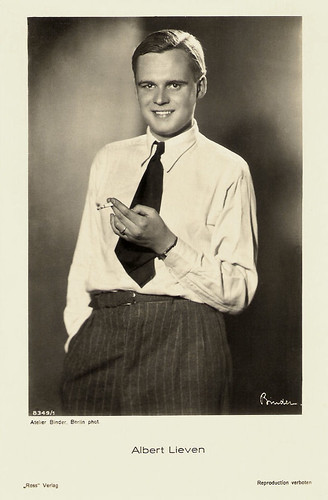
German postcard by Ross Verlag, no. 8349/1, 1934-1935. Photo: Atelier Binder, Berlin.
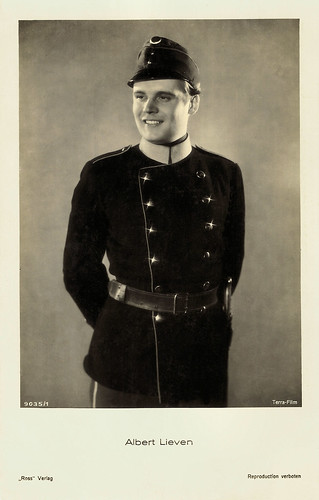
German postcard by Ross Verlag, no. 9035/1, 1935-1936. Photo: Terra-Film. Albert Lieven in Hermine und die sieben Aufrechten/Hermine and the Seven Upright Men (Frank Wisbar, 1935).
The impetuous young man
Albert Lieven was born Albert Fritz Liévin in Hohenstein, Germany (now Olsztynek, Poland) in 1906. His father, Dr. Walter Liévin, was a renowned lung specialist, and his family produced more noted physicians. Albert grew up in East Prussia. He first acted on stage at the Hoftheater in Gera in 1928, and later in the ensemble cast at the Preussische Staatstheater in Berlin.
He started his screen career as a dashing young ensign in the German comedy Annemarie, die Braut der Kompanie/Bride of the Company (Carl Boese, 1932) featuring Lucie Englisch. It was followed by the musical comedy Ich bei Tag und du bei Nacht/I by Day, You by Night (Ludwig Berger, 1932) starring Käthe von Nagy and Willy Fritsch.
During the next four years, he appeared as the impetuous young man or romantic lead in another fifteen films, including in the melodrama Reifende Jugend/The Growing Youth (Carl Froelich, 1933) with Heinrich George, and a German film adaptation of the cross-dressing farce 'Charley's Aunt', Charleys Tante (Robert A. Stemmle, 1934) with Fritz Rasp and Paul Kemp.
In 1936, owing to the rise of the Nazi Party in Germany and his wife being Jewish, he emigrated from Germany to France to Britain (according to Wikipedia his wife was Tatjana Lieven; IMDb mistakenly mentions Petra Peters – but she was born in 1925). His first stage role in the West End was as Prince Ernest of Saxe-Cobourg and Gotha in Laurence Housman’s play 'Victoria Regina' in 1937.
In the screen adaptation, Victoria the Great (Herbert Wilcox, 1937), his part was played by Walter Rilla. Lieven only had a bit part in this historical film, starring Anna Neagle as Queen Victoria. On the London stage, he also appeared in the comedy 'Rake's Progress' and the drama 'The Deacon and the Jewess', which were both entirely televised by the BBC in 1939. Lieven also featured in BBC foreign service radio broadcasts as a newsreader and reporter.

German postcard. Photo: Europa Verleih. Peter Voss, Albert Lieven and Hertha Thiele in Reifende Jugend/The Growing Youth (Carl Froelich, 1933).
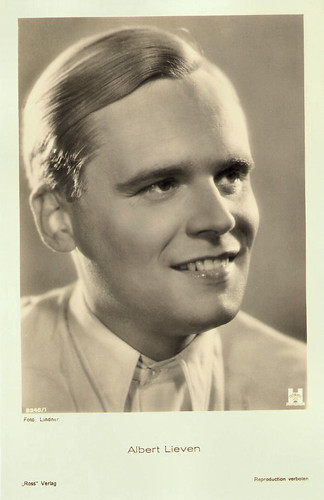
German postcard by Ross Verlag, no. 8348/1, 1934-1935. Photo: Lindner / Hisa Film.
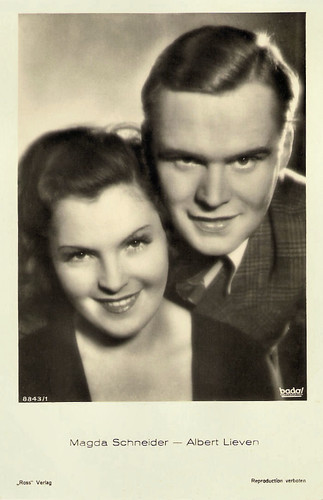
German postcard by Ross Verlag, no. 8843/1, 1934-1935. Photo: Badal Filmproduktion. Publicity still for Fräulein Liselott/Miss Liselott (Johannes Guter, 1934) with Magda Schneider.
The Nazi villain or snarling Prussian
During World War II, Albert Lieven stayed in Great Britain. From 1939 to 1951 he was affiliated with the Rank Organization as a character actor. In the year 1940, he was credited with seven British films. In many films, he played the Nazi villain or snarling Prussian, such as a concentration camp guard in the war thriller Night Train to Munich (Carol Reed, 1940) with Margaret Lockwood and Rex Harrison. Hal Erickson at AllMovie: “His characters weren't all Nazis, though many of them behaved as though their first words as infants had been ‘Sieg heil.’”
His best-known films of the war period include the romantic drama The Life and Death of Colonel Blimp (Michael Powell, Emeric Pressburger, 1943) with Roger Livesey, and the psychological melodrama The Seventh Veil (Compton Bennett, 1945) with James Mason and Ann Todd. In 1948, Lieven performed on Broadway in Terrence Rattigan’s play 'The Winslow Boy', and next did some international tours.
In 1951 (or 1952 – the sources differ), he returned to Germany, and there he also appeared on TV and in many films. The first was Die Dubarry/Madame Dubarry (Georg Wildhagen, Reinhold Schünzel, 1951) with Sari Barabas and Willy Fritsch. Other German films were the crime film Das Bekenntnis der Ina Kahr/The Confession of Ina Kahr (Georg Wilhelm Pabst, 1954) featuring Elisabeth Müller, and the war drama Des Teufels General/The Devil's General (Helmut Käutner, 1955) with Curd Jürgens.
He also continued to appear in both British films as well as in Hollywood productions. The best known is the all-star adventure film The Guns of Navarone (J. Lee Thompson, 1961), in which he once again played a German commandant, and the war film The Victors (Carl Foreman, 1963). On TV he was often seen in German crime series, based on popular novels by Francis Durbridge. His final film appearance was in the nostalgic German comedy Die Feuerzangenbowle/The Hot Wine Punch (Helmut Käutner, 1970) with Walter Giller.
In 1971, Albert Lieven died of cancer at home in Farnham near London, England. He was 65. Lieven was married five times, to Anne-Marie Schäfer-Röhrig Tatjana (Tania) Silbermann, Valerie White, Susan Shaw and Petra Peters. All marriages ended in a divorce. He had a son from his second marriage and a daughter, Anna Lieven, from his marriage with British film star Susan Shaw. His grandson is the Newcastle and England rugby player Toby Flood.
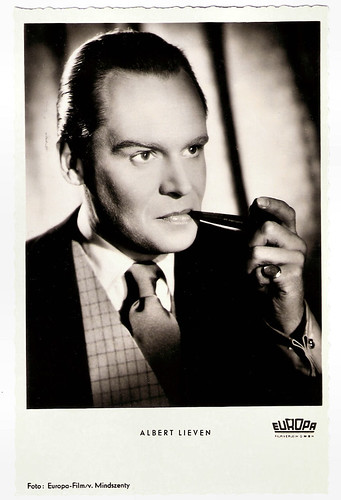
German postcard by Kunst und Bild, Berlin, A 585. Photo: Europa-Film / Von Mindszenty. Publicity still for Klettermaxe/Corry Bell (Kurt Hoffmann, 1952).
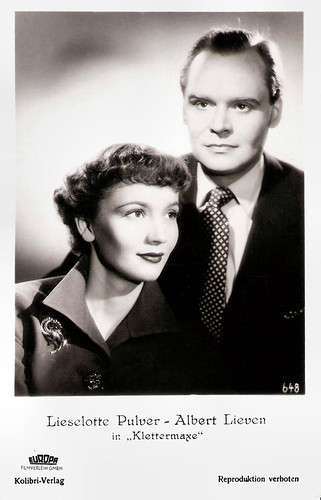
German postcard by Kolibri-Verlag, Minden/Westf., no. 648. Photo: Europa Filmverleih. Liselotte Pulver and Albert Lieven in Klettermaxe/Corry Bell (Kurt Hoffmann, 1952).
Sources: Hans-Michael Bock and Tim Bergfelder (The Concise Cinegraph - German), Stephanie D’heil (Steffi-line - German), Peter Ritter (Ostpreussen - Page now defunct), Richard Kay (MailOnline), Wikipedia, and IMDb.
This post was last updated on 22 March 2025.
No comments:
Post a Comment